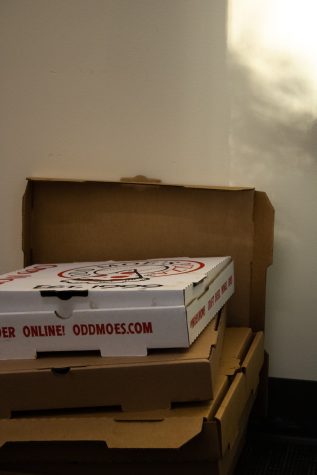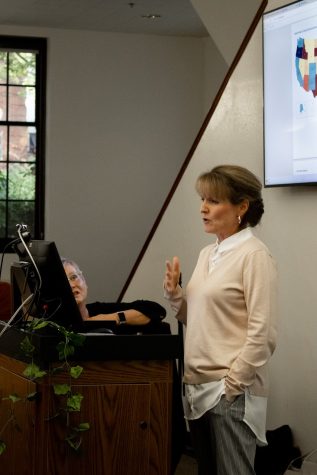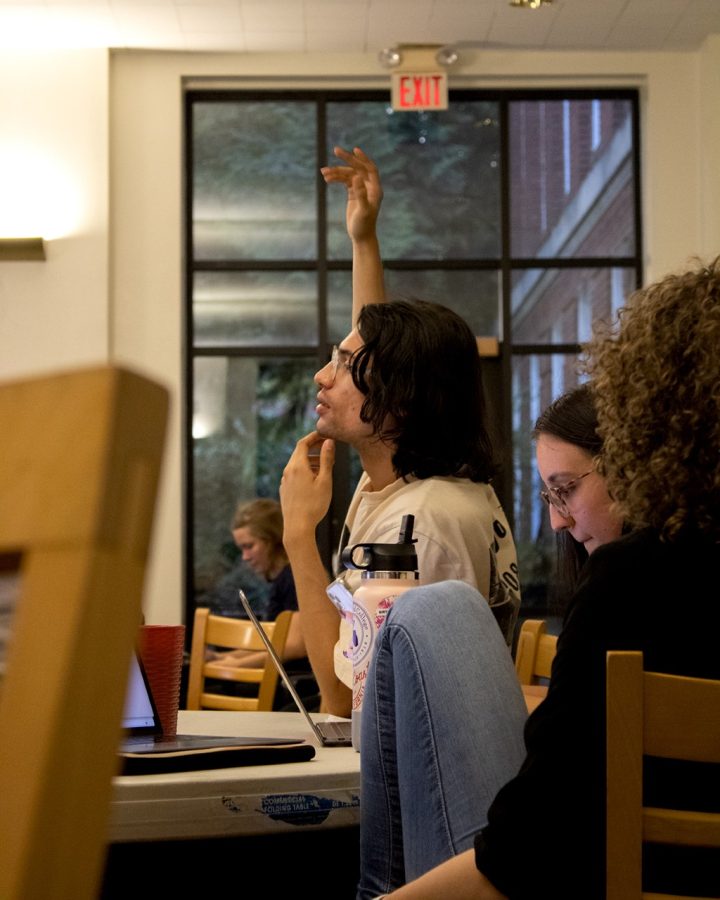Linfield hosts Pizza and Politics on overturning of Roe v. Wade, bringing largest crowd the event in years
October 25, 2022
On October 13, Johansson Hall hosted one of the largest crowds it has ever seen for Pizza and Politics, an evening with Linfield University professors sharing their views on the recent overturning of Roe v. Wade. The panel hosted four professors, and each brought their own view on the issue to the over 50 attendees.

Roe v. Wade, which guaranteed the right to abortion and was originally decided in 1971, was overturned in late June of this year. Its effects spread quickly, affecting women across the country.
While each professor at the panel focused on different topics, the major theme of the discussion was what they believe the future will hold for women across America, and how we all can help.
The first professor that spoke was Rachel Schley, of the history department. While she mainly focuses on modern Europe and the Mediterranean, her specialty is modern France as well as modern Jewish history.
Schley started off the conversation with the question, “does anyone know what human rights are?” After a few timid answers here and there, she went on to explain the phrase
“We talk about these things [human rights] as inalienable rights… we cannot find them in nature, humans made them,” Schley said.
The professor then led the audience through a brief history of the western world. “The nations of the world had to come together to articulate these rights, to ensure that they were worth protecting and ensuring,” Schley said. However, in each country there was one group of people who were left out every time: women. Schley was quick to tell the audience that “when the question of women’s rights came up, they didn’t even discuss it.”
Next on the panel to speak was Dawn Nowacki, a political science professor. She is currently teaching international politics, and was quick to incorporate connections with that class to the audience.
Nowacki started her portion of the conversation by continuing where Schley left off. Early on in Schley’s argument, she mentioned a certain treaty, the Convention on the Elimination of All Forms of Discrimination Against Women (CEDAW).
Nowacki expanded on the history professor’s thoughts, giving a brief history of the treaty. Although it was originally established in 1948, it took a number of years for most countries to ratify it themselves.
Today, 189 countries have signed off and officially ratified it. However, there remain seven who have not done either. While many of the missing signatures are expected, due to their own histories with women’s rights, the United States was one that no member on the panel or in the audience anticipated.
The third professor to speak is also a member of the political science department, Robin Barklis. Barklis specializes in the Supreme Court, as well as the law.
Barkli’s main argument was covering the three aspects of the Supreme Court’s decision to overturn Roe v. Wade. These were the constitutional basis of reproductive rights, how it was reinterpreted, and what the fight for rights will look like moving forward.
Overall, the point Barklis continued to stress was that the only way something would change is through mass political action.
Like many of the other speakers on the panel, Barklis was optimistic that if there was truly a will and hope for change, Congress could constitutionally act and hopefully improve the current situation for women.
The last speaker on the panel was Amy Orr, a professor in the sociology department. While many of the speakers took more of a discussion-based approach to the conversation, Orr focused on the facts.

She jumped into the conversation headfirst, starting with how abortions and women’s healthcare impact everyone. Around one-third of pregnancies are either unwanted or unexpected at the time of conception, Orr informed the audience.
While she said the fight for abortion access is one we should all care about, Orr focused on the direct impact of women from this Supreme Court decision. The topic of women’s healthcare also has a direct impact to racial and ethnic discrimination.
While each professor came to the panel with their own part of the discussion and agenda in mind, their messages were all similar.
The Dobbs v. Jackson Women’s Health Organization decision can be found here.

